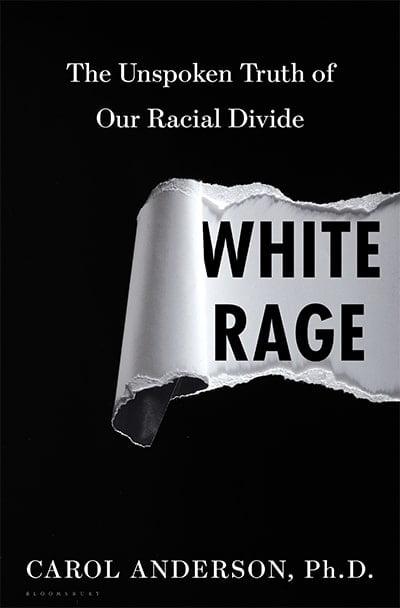White Rage
by Kathy Grear 10/16/2017
From the Civil War to our combustible present, acclaimed historian Carol Anderson reframes our continuing conversation about race, chronicling the powerful forces opposed to black progress in America.
As Ferguson, Missouri, erupted in August 2014, and media commentators across the ideological spectrum referred to the angry response of African Americans as “black rage,” historian Carol Anderson wrote a remarkable op-ed in The Washington Post suggesting that this was, instead, “white rage at work. With so much attention on the flames,” she argued, “everyone had ignored the kindling.”
Since 1865 and the passage of the Thirteenth Amendment, every time African Americans have made advances towards full participation in our democracy, white reaction has fueled a deliberate and relentless rollback of their gains. The end of the Civil War and Reconstruction was greeted with the Black Codes and Jim Crow; the Supreme Court’s landmark 1954 Brown v. Board of Education decision was met with the shutting down of public schools throughout the South while taxpayer dollars financed segregated white private schools; the Civil Rights Act of 1964 and Voting Rights Act of 1965 triggered a coded but powerful response, the so-called Southern Strategy and the War on Drugs that disenfranchised millions of African Americans while propelling presidents Nixon and Reagan into the White House, and then the election of America’s first black President, led to the expression of white rage that has been as relentless as it has been brutal.
Carefully linking these and other historical flashpoints when social progress for African Americans was countered by deliberate and cleverly crafted opposition, Anderson pulls back the veil that has long covered actions made in the name of protecting democracy, fiscal responsibility, or protection against fraud, rendering visible the long lineage of white rage. Compelling and dramatic in the unimpeachable history it relates, White Rage will add an important new dimension to the national conversation about race in America.

“White rage is not about visible violence, but rather it works its way through the courts, the legislatures, and a range of government bureaucracies. It wreaks havoc subtly, almost imperceptibly. — Excerpt from “White Rage”
Non-fiction. By Carol Anderson. 2016. 256 pages.
Time Periods: 2001 – Present, 21st Century
Reading Levels: Adult, High School
[arve align=”center” thumbnail=”21433″ mp4=”https://9c5996605f.nxcli.net/videos/Carol-Anderson-Discusses-White-Rage.mp4″ /]
Professor Carol Anderson talked about her book White Rage: The Unspoken Truth of Our Racial Divide, in which she chronicles when in history black progress has been met by what she calls “white rage.”
Additional videos:
- Race and Gender Colloquium Series:
“White Rage: Unspoken Truth of Our Racial Divide” - Tavis Smiley | Carol Anderson on White Rage | PBS

Carol Anderson is professor of African American Studies at Emory University. She is the author of the critically-acclaimed White Rage, published by Bloomsbury (2016).
Professor Anderson is also the author of Eyes Off the Prize: The United Nations and the African-American Struggle for Human Rights, 1944-1955(Cambridge University Press), which was awarded both the Gustavus Myers and Myrna Bernath Book Awards. Her book Bourgeois Radicals: The NAACP and the Struggle for Colonial Liberation,1941-1960 was published by Cambridge in 2014.
Her research has garnered substantial fellowships from the American Council of Learned Societies, the Ford Foundation, National Humanities Center, Harvard University, and the Gilder Lehrman Institute of American History.
She has also served on working groups dealing with race at Stanford’s Center for Applied Science and Behavioral Studies, the Aspen Institute, and the United Nations. In addition, based on the strength and accessibility of her research, the leadership at Amnesty International, USA, the American Civil Liberties Union, the Ford Foundation, and others have used Eyes Off the Prize to frame and examine their human rights work in the United States.
This has also led to sought after commentary in Foreign Policy, the Washington Post, and CNN.com that places contemporary issues dealing with race, human rights, and politics in a historical perspective. Her Washington Post op-ed, “White Rage,” was the most widely shared for the paper in 2014.
Professor Anderson was a member of the U.S. State Department’s Historical Advisory Committee and the Board of Directors of the Harry S. Truman Library Institute and the National Economic and Social Rights Initiative.
She is a Phi Beta Kappa graduate of Miami University, where she earned bachelor’s and master’s degrees in Political Science (International Relations) and History. She earned her Ph.D. in history from The Ohio State University.
“White Rage is a riveting and disturbing history that begins with Reconstruction and lays bare the efforts of whites in the South and North alike to prevent emancipated black people from achieving economic independence, civil and political rights, personal safety, and economic opportunity.” – The Nation
“[White Rage] is an extraordinarily timely and urgent call to confront the legacy of structural racism bequeathed by white anger and resentment, and to show its continuing threat to the promise of American democracy.” – Editor’s Choice, New York Times Book Review
“An unflinching look at America’s long history of structural and institutionalized racism, White Rage is a timely and necessary examination of white anger and aggression towards black America . . . A compelling look at American history, White Rage has never seemed more relevant than it does today.” – Bustle, “17 Books On Race Every White Person Needs To Read”
“There’s a book called White Rage by Carol Anderson about a history that most Americans don’t know: the history of oppression that African Americans have faced from the Civil War to the present day. If every American read it, maybe we could really begin to have a conversation about race in America.” – Senator Al Franken, in answer to the question, “What’s the one book you wish all Americans would read right now?”, New York Times Book Review



No Comments so far
Jump into a conversationNo Comments Yet!
You can be the one to start a conversation.Only registered users can comment.